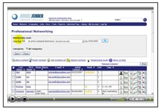
Our relationship started just a few weeks ago with a simple e-mail – he suggested something and I replied. As e-mails went back and forth our relationship grew. I was impressed because he cared enough about my passion to want it improved. He also wanted to talk about some of the philosophy behind networking (like, “why/when do you change the rank of a network contact?” (if you have read Never Eat Alone some of this should sound familiar to you)).
Because of the interest that Jeroen shows, and the dialogue that we’ve had, our relationship is deeper than with someone who may have just e-mailed me and not had much to say. That’s not a good or a bad thing, it’s just a different relationship.
I would rank Jeroen as a four-star relationship right now. Even though we’ve only known each other for a short period of time, the level of discussion we’ve had (and the interest he’s taken) merits a stronger ranking.
I would rank the person who just e-mailed me yesterday saying that they really like JibberJobber and are interested in sending people my way as a one star – this is based on just having one e-mail come in and not having a chance to develop the relationship. To me, one star means there is room for improvement – and I want to do what I can to move that relationship forward.
The key to ranking is that it’s all subjective – I don’t pretend to offer a methodology or science behind it. It has to be flexible enough to allow you to make the ultimate decision – so we offer five stars and you can rank the relationship how you want.

One last question – Jeroen asks when do I downgrade a relationship? That is, when do I move a ranking from four-star to two-star?
Again, realize this is subjective. In the last year there may have been one or two people that I’ve downgraded in my own network. They were downgraded after specific incidents – something happened where I felt a violation of trust or something like that. These are not the typical goofy things we face with normal human interaction – these were blatant offenses where I felt hurt, and I wanted to pull back a little.
Would I downgrade a relationship because we have not communicated for a long time? No. I fell “out of touch” with one of my best friends (who actually reads my blog) for many years. But when we talk and e-mail, however infrequent, we seem to pick up where we left off. A long pause in communication has not been a reason for me to downgrade a relationship.
So there you go, I hope this helps understand what I consider to be one of the most important aspects of JibberJobber.



Congrats on your blog being cited in The Wall Street Journal!
I’m still not convinced either way in the relationship degrading debate, but I think we have been debating it for the wrong reasons (you know, the ‘why’ of this discussion). Why does the ranking matter?
I’d say you use contact ranking in two situations:
1) you want to determine how ‘useful’ (blergh) a contact is
2) you want to determine which relationships you need to work on
The area where JibberJobber can probably be the most useful is in #2. And for that purpose it probably does not matter whether you are supposed to decrease a rating over time or not: in either case you want to be reminded when you have not spoken to someone for a while. Assuming you use your log, JibberJobber could do that for you.
Also, if you regularly review your contacts (either because you add a log – add it to that form please – or because you are reminded of them) any changes in the relationship rating happen automatically, because you re-evaluate it based on the current situation. So, the rating will be accurate in case you want to use it for #1.
So is this the solution to our debate? Well, the question here is how often JibberJobber needs to remind you. There are probably three approaches:
1) a 1-star contact needs as frequently attention as a 5-star, because they are all relations that need to be maintained
2) a 1-star contact needs a lot more of your attention, because the 5-star relationship is very healthy and (as you write) it will survive not speaking for a couple of years
3) a 5-star contact needs a lot more of your attention, because that person will be used to speaking to you more often
So now the debate is slightly different, but just as impossible. If such a feature would be implemented, you could of course leave this to use to configure, but that’s a bit cheap 😉 We want to figure this out now!
Anyone have any input?
I think there are 2 ways to use the stars: 1 for potential, and 1 for closeness. Perhaps you can add another toolbar that has 2 sets of rankings?
Also, I was wondering when JibberJobber is going to interface with the Gmail API so I can suck all my contacts in from my Gmail account (or if it does this already, can you tell me how).
Thanks Jason for creating this great tool, and Jeroen for deeply contributing to the conversation.